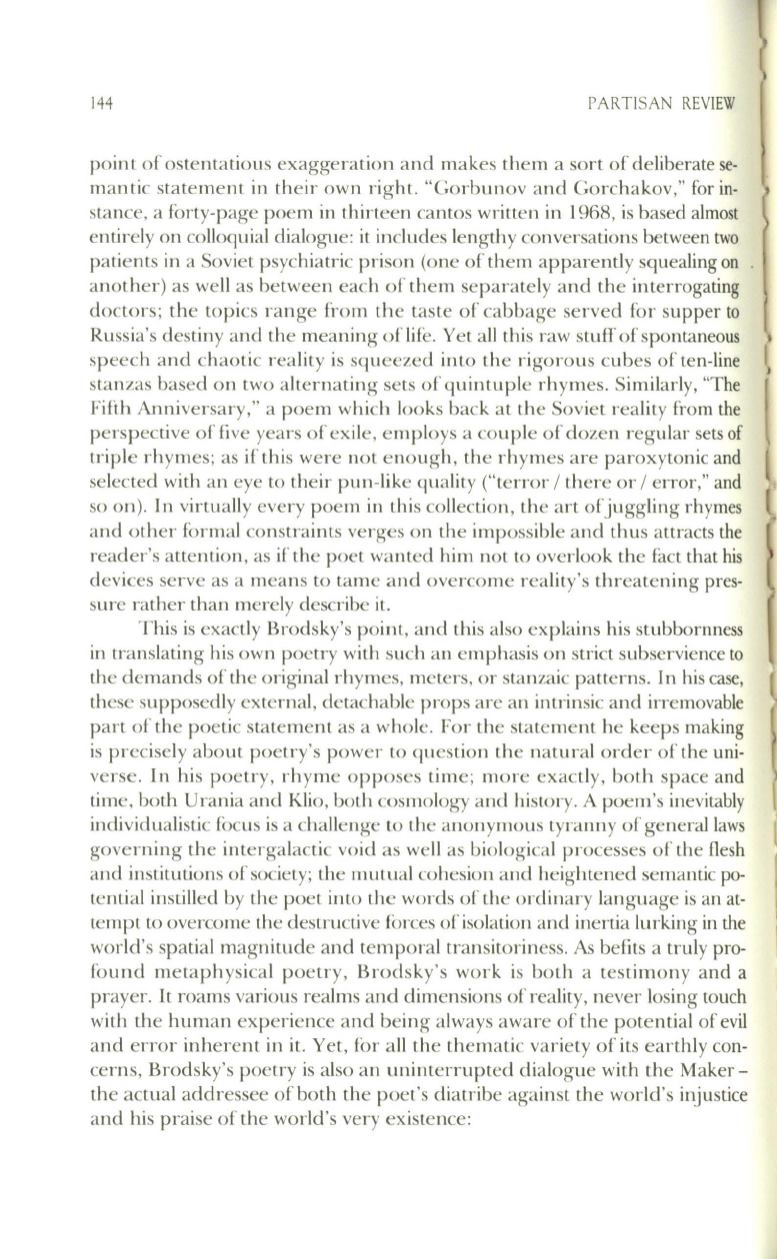
144
PARTISAN REVIEW
point of ostentatious exaggeration and makes them a sort of deliberate se–
mantic statement in their own right. "Gorbunov and Gorchakov," for in–
stance, a forty-page poem in thirteen cantos written in 1968, is based almost
entirely on colloquial dialogue: it includes lengthy conversations between two
patients in a Soviet psychiatric prison (one of them apparently squealing on
another) as well as between each of them separately and the interrogating
doctors; the topics range from the taste of cabbage served for supper to
Russia's destiny and the meaning of life. Yet all this raw stuff of spontaneous
speech and chaotic reality is squeezed into the rigorous cubes of ten-line
stanzas based on two alternating sets of quintuple rhymes. Similarly, "The
Fifth Anniversary," a poem which looks back at the Soviet reality from the
perspective of five years of exile, employs a couple of dozen regular sets of
triple rhymes; as if this were not enough, the rhymes are paroxytonic and
selected with an eye to their pun-like quality ("terror / there or / error," and
so on). In virtually every poem in this collection, the art ofjuggling rhymes
and other formal constraints verges on the impossible and thus attracts the
reader's attention, as if the poet wanted him not to overlook the fact that
his
devices serve as a means
to
tame and overcome reality 's threatening pres–
sure rather than merely describe it.
This is exactly Brodsky's point, and this also explains his stubbornness
in translating his own poetry with such an emphasis on strict subservience to
the demands of the original rhymes, meters, or stanzaic patterns. In his case,
these supposedly external, detachable props are an intrinsic and irremovable
part of the poetic statement as a whole. For the statement he keeps making
is precisely about poetry's power to question the natural order of the uni–
verse. In his poetry, rhyme opposes time; more exactly, both space and
time, both Urania and Klio, both cosmology and history. A poem's inevitably
individualistic focus is a challenge to the anonymous tyranny of general laws
governing the intergalactic void as well as biological processes of the flesh
and institutions of society; the mutual cohesion and heightened semantic po–
tential instilled by the poet into the words of the ordinary language is an at–
tempt to overcome the destructive forces of isolation and inertia lurking in the
world's spatial magnitude and temporal transitoriness.
As
befits a truly pro–
found metaphysical poetry, Brodsky's work is both a testimony and a
prayer. It roams various realms and dimensions of reality, never losing touch
with the human experience and being always aware of the potential of evil
and error inherent in it. Yet, for all the thematic variety of its earthly con–
cerns, Brodsky's poetry is also an uninterrupted dialogue with the Maker –
the actual addressee of both the poet's diatribe against the world 's injustice
and his praise of the world's very existence:
i
I
)
I
l
l


